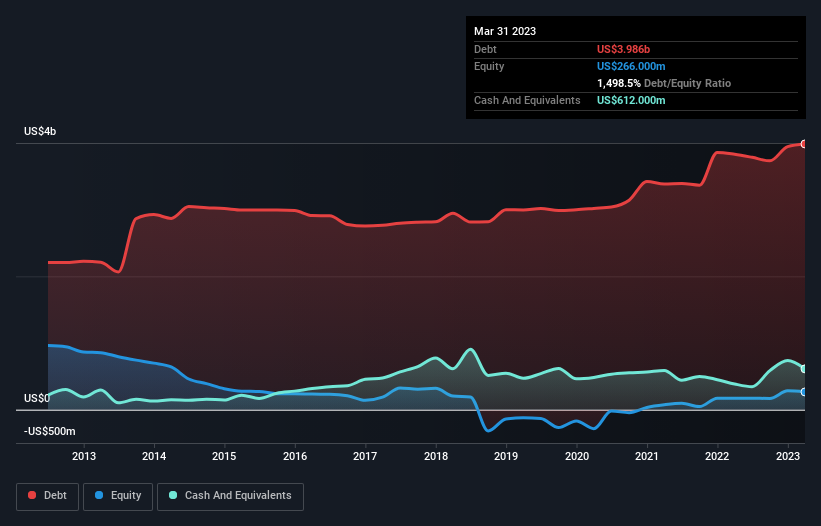- United States
- /
- Entertainment
- /
- NasdaqGS:WMG
Does Warner Music Group (NASDAQ:WMG) Have A Healthy Balance Sheet?

Legendary fund manager Li Lu (who Charlie Munger backed) once said, 'The biggest investment risk is not the volatility of prices, but whether you will suffer a permanent loss of capital.' When we think about how risky a company is, we always like to look at its use of debt, since debt overload can lead to ruin. We note that Warner Music Group Corp. (NASDAQ:WMG) does have debt on its balance sheet. But the more important question is: how much risk is that debt creating?
When Is Debt A Problem?
Debt is a tool to help businesses grow, but if a business is incapable of paying off its lenders, then it exists at their mercy. If things get really bad, the lenders can take control of the business. However, a more common (but still painful) scenario is that it has to raise new equity capital at a low price, thus permanently diluting shareholders. Of course, debt can be an important tool in businesses, particularly capital heavy businesses. When we think about a company's use of debt, we first look at cash and debt together.
See our latest analysis for Warner Music Group
What Is Warner Music Group's Debt?
The image below, which you can click on for greater detail, shows that at March 2023 Warner Music Group had debt of US$3.99b, up from US$3.83b in one year. However, it also had US$612.0m in cash, and so its net debt is US$3.37b.

A Look At Warner Music Group's Liabilities
The latest balance sheet data shows that Warner Music Group had liabilities of US$3.19b due within a year, and liabilities of US$4.56b falling due after that. On the other hand, it had cash of US$612.0m and US$1.02b worth of receivables due within a year. So its liabilities outweigh the sum of its cash and (near-term) receivables by US$6.12b.
While this might seem like a lot, it is not so bad since Warner Music Group has a huge market capitalization of US$14.0b, and so it could probably strengthen its balance sheet by raising capital if it needed to. But it's clear that we should definitely closely examine whether it can manage its debt without dilution.
We measure a company's debt load relative to its earnings power by looking at its net debt divided by its earnings before interest, tax, depreciation, and amortization (EBITDA) and by calculating how easily its earnings before interest and tax (EBIT) cover its interest expense (interest cover). This way, we consider both the absolute quantum of the debt, as well as the interest rates paid on it.
Warner Music Group's debt is 3.3 times its EBITDA, and its EBIT cover its interest expense 5.4 times over. This suggests that while the debt levels are significant, we'd stop short of calling them problematic. Warner Music Group grew its EBIT by 4.6% in the last year. That's far from incredible but it is a good thing, when it comes to paying off debt. When analysing debt levels, the balance sheet is the obvious place to start. But it is future earnings, more than anything, that will determine Warner Music Group's ability to maintain a healthy balance sheet going forward. So if you want to see what the professionals think, you might find this free report on analyst profit forecasts to be interesting.
Finally, a company can only pay off debt with cold hard cash, not accounting profits. So we always check how much of that EBIT is translated into free cash flow. During the last three years, Warner Music Group produced sturdy free cash flow equating to 54% of its EBIT, about what we'd expect. This free cash flow puts the company in a good position to pay down debt, when appropriate.
Our View
We weren't impressed with Warner Music Group's level of total liabilities, and its net debt to EBITDA made us cautious. On the other hand, we found comfort in its relatively strong conversion of EBIT to free cash flow. When we consider all the factors mentioned above, we do feel a bit cautious about Warner Music Group's use of debt. While we appreciate debt can enhance returns on equity, we'd suggest that shareholders keep close watch on its debt levels, lest they increase. When analysing debt levels, the balance sheet is the obvious place to start. However, not all investment risk resides within the balance sheet - far from it. Be aware that Warner Music Group is showing 2 warning signs in our investment analysis , and 1 of those is a bit unpleasant...
If you're interested in investing in businesses that can grow profits without the burden of debt, then check out this free list of growing businesses that have net cash on the balance sheet.
Valuation is complex, but we're here to simplify it.
Discover if Warner Music Group might be undervalued or overvalued with our detailed analysis, featuring fair value estimates, potential risks, dividends, insider trades, and its financial condition.
Access Free AnalysisHave feedback on this article? Concerned about the content? Get in touch with us directly. Alternatively, email editorial-team (at) simplywallst.com.
This article by Simply Wall St is general in nature. We provide commentary based on historical data and analyst forecasts only using an unbiased methodology and our articles are not intended to be financial advice. It does not constitute a recommendation to buy or sell any stock, and does not take account of your objectives, or your financial situation. We aim to bring you long-term focused analysis driven by fundamental data. Note that our analysis may not factor in the latest price-sensitive company announcements or qualitative material. Simply Wall St has no position in any stocks mentioned.
About NasdaqGS:WMG
Warner Music Group
Operates as a music entertainment company in the United States, the United Kingdom, Germany, and internationally.
Proven track record and fair value.


